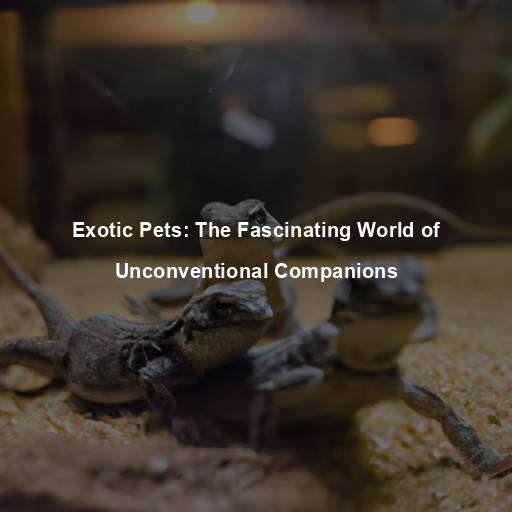Are Chinchillas Exotic Pets?
Last Updated on October 21, 2023 by Evan
Contents
- 1 Unveiling the Fascinating World of Chinchillas
- 2 The Appeal of Chinchillas as Pets
- 3 The Exotic Pet Debate
- 4 The Bottom Line: Chinchillas as Exotic Pets
- 5 Health and Wellness: Nurturing a Happy Chinchilla
- 6 Chinchilla Care: Creating a Safe and Stimulating Environment
- 7 Chinchilla Lifespan: A Long-Term Commitment
- 8 FAQs
Unveiling the Fascinating World of Chinchillas
Enter the whimsical realm of chinchillas – those irresistibly cute, fur-covered beings that have captured the hearts of pet enthusiasts far and wide. But, hold on tight, because we’re about to unravel a puzzle. Are these delightful creatures merely pets, or do they possess an air of exotic allure? Brace yourself, as we embark on a journey to unravel the mysteries and uncover the distinctive traits that make chinchillas the extraordinary companions they are.
Understanding Exotic Pets
Before we determine whether chinchillas fall into the category of exotic pets, let’s establish a clear definition. Exotic pets are often defined as animals that are not commonly domesticated or found in the typical household. These animals can include reptiles, amphibians, birds, and small mammals that are not native to a particular region.
Native Habitat of Chinchillas
Chinchillas are native to the Andes Mountains in South America, where they inhabit rocky areas and crevices. These small rodents have adapted to the high altitude and dry climate of their natural habitat. Their dense fur helps them survive the cold temperatures and provides excellent insulation.
Chinchillas as Pets
The enchanting allure of chinchillas as pets has taken the world by storm, captivating hearts with their whimsical antics, velvety coats, and enigmatic demeanor. These petite darlings have become a popular choice for pet enthusiasts, owing to their diminutive stature and relatively undemanding upkeep. Nonetheless, it is crucial to be mindful that chinchillas demand an extraordinary level of care and a tailored habitat to flourish, setting them apart from the more conventional companions like feline sophisticates or loyal canine confidants.
The Appeal of Chinchillas as Pets
Unique Physical Characteristics
It’s hard to resist the allure of chinchillas as pets – their eye-catching physical features make them absolutely captivating. With their fur boasting an array of colors like shades of gray, beige, white, and black, these little creatures are a visual treat. Beyond their aesthetic appeal, their dense and velvety coat serves as a protective shield against any potential threats lurking in the wild.
Social Nature
Chinchillas, these intriguing creatures of the animal kingdom, possess remarkable social skills, relishing the joys of companionship within their own species. Building deep connections with their beloved human counterparts, they swiftly transform into cherished and affectionate pets. Nevertheless, it is crucial to understand their gentle nature, as they may find rough handling rather disconcerting.
Low Allergenic Potential
If you suffer from allergies but still crave the companionship of a furry friend, look no further than chinchillas! These delightful creatures are a fantastic choice for allergy-prone individuals due to their low allergen production. Unlike our beloved cats and dogs, chinchillas won’t leave you sniffling and sneezing, providing a genuinely unique pet experience.
The Exotic Pet Debate
Legal Considerations
The classification of chinchillas as exotic pets varies depending on local regulations and laws. In some regions, they are considered exotic due to their non-native status. It’s crucial for potential chinchilla owners to research and comply with local laws to ensure they can legally keep these furry companions.
Specialized Care Requirements
Chinchillas have specific care needs that set them apart from more common household pets. Their delicate respiratory systems require a dust bath to maintain proper hygiene and prevent skin conditions. Chinchillas also have unique dietary requirements, as they are herbivorous and need a diet rich in high-quality hay and fresh vegetables.
Environmental Considerations
Creating the perfect habitat for chinchillas is indispensable to ensure their overall happiness and welfare. These delightful creatures thrive in roomy enclosures that boast several levels, allowing them to exercise their exceptional climbing skills. Given their preference for a nocturnal lifestyle, it becomes imperative to offer these furry friends a serene haven, shielded from bright lights and noise to foster their authentic behavioral patterns.
The Bottom Line: Chinchillas as Exotic Pets
After much contemplation, it has come to our attention that the classification of chinchillas as exotic pets is a perplexing matter, fraught with intricacies. One’s perspective on the matter may be greatly influenced by regional regulations, which seem to vary like gusts of wind on a stormy day. Despite not being as ubiquitously domesticated as their feline and canine counterparts, chinchillas have managed to captivate the hearts of many, thanks to their enchanting personalities and distinctive traits that set them apart from the ordinary.
However, it’s important to note that chinchillas require specialized care, a suitable environment, and a commitment to meeting their specific needs. Potential owners should thoroughly research and educate themselves on chinchilla care before deciding to bring one into their home.
The enigmatic world of chinchillas beckons, leaving many perplexed about their status as exotic pets. Delve into the tapestry of opinions, for the answer to this query is as diverse as the myriad of colors within their plush fur. Ensnaring hearts with their undeniable charm, these captivating creatures impart a sense of wonder and delight to those who embark on the adventure of providing them with the tender care and devoted attention they so deserve.
Stay tuned for more fascinating insights into the world of pets on PetsRoof.com, your go-to source for all things pets!
Note: This is not an exhaustive guide on chinchilla care. It is essential to consult reputable sources and experts for comprehensive information before adopting a chinchilla as a pet.## Chinchillas: A Delicate Balance of Temperament and Behavior
Temperament Traits
There’s something truly captivating about chinchillas as pets. Their intriguing mix of curiosity, intelligence, and agility never ceases to amaze. But here’s the twist – these furry creatures are far from cookie-cutter copies. Each chinchilla brings their own distinctive personality to the table, leaving us puzzled by their unique temperaments.
Socialization
When it comes to chinchillas, socializing them when they’re young is key to unraveling the mysteries of their furry ways. The secret lies in the gentle art of handling – a delicate dance that weaves trust between humans and these little fluffballs. However, it’s worth noting that chinchillas are not exactly the cuddling type; they prefer to stake their claim on the world by exploring it on their own terms. So, instead of picking them up like a prized possession, it’s best to let them roam and reign over their realm.
Communication and Vocalizations
In the alluring world of chinchillas, a melodious symphony of communication awaits. These fluffy creatures possess an enigmatic language, a mesmerizing blend of vocalizations and body movements. With a repertoire of chirps, barks, and purrs, chinchillas unveil their emotions, expressing their desires and signaling their well-being. Deciphering this cryptic lexicon unlocks a deeper connection, guiding owners to understand their chinchilla’s whims and safeguard their contentment.
Health and Wellness: Nurturing a Happy Chinchilla
Common Health Concerns
Like any living creature, chinchillas are prone to certain health issues. Some common ailments include dental problems, digestive disorders, fur fungus, and respiratory infections. Regular veterinary check-ups and a proper diet can help prevent or detect these issues early on. It is crucial to consult a veterinarian who specializes in exotic pets to ensure the health and well-being of a pet chinchilla.
Diet and Nutrition
Ensuring the wellbeing of our furry little friends, like chinchillas, can sometimes feel as puzzling as finding your way through a labyrinth of nutritional choices. Striving for a balance that sets their hearts aflutter, experts suggest that their menu should be primarily graced by the presence of high-quality hay, a delightful aid for their digestion and a trusted provider of essential fiber. However, like a jazz tune that surprises with unexpected chords, it’s worth treading lightly when incorporating those pellets that are made solely for chinchillas, making sure not to overindulge in their crunchy goodness. And as if to add another twist to this epicurean tale, colorful vegetables make their appearance on the menu, performing as occasional treats that can bring joy to their tiny, fuzzy souls.
Exercise and Enrichment
Ensuring the optimal health of pet chinchillas is no small feat. These sprightly creatures thrive on both physical exercise and mental stimulation, an intricate balancing act that contributes to their overall well-being. To prevent the onset of fluff-induced obesity and retain their svelte physiques, these active animals necessitate regular doses of physical activity. By granting them a secure playpen to venture beyond the confines of their dwellings, as well as a myriad of captivating toys and chewables, owners can satiate their furry companion’s innate instincts while providing endless amusement.
Chinchilla Care: Creating a Safe and Stimulating Environment
Housing Requirements
When it comes to creating the perfect living space for chinchillas, spaciousness and security are key. We highly recommend opting for wire cages with solid floors to ensure those delicate little paws stay injury-free. It’s also important to keep their active spirits in mind by providing multiple levels and platforms for them to conquer through climbing and jumping. And of course, let’s not forget the importance of cozy hiding spots and a snug nesting area to make them feel safe and content.
Temperature and Humidity
For chinchillas, comfort is key when it comes to their living conditions. They have a delicate relationship with the elements, preferring cooler temperatures in the range of 60-70°F (15-21°C). It’s crucial to shield them from the harsh effects of direct sunlight, drafts, and excess moisture. By conscientiously monitoring the temperature and humidity levels in their habitat, you can ensure their well-being and reduce the risk of heatstroke and respiratory complications.
Dust Baths and Grooming
Taking care of your beloved chinchilla requires more than just a standard grooming routine. With their luxurious, dense fur, these adorable creatures have unique needs that demand attention and special care. Enter the chinchilla dust bath, a shimmering oasis of cleanliness that keeps their coat in prime condition. By providing a dedicated container filled with premium chinchilla dust, available at reputable pet stores, you’ll not only delight your furry friend but also ensure they can indulge in their instinctive rolling and cleansing rituals, bidding farewell to unwanted oils and preserving their natural insulation.
Chinchilla Lifespan: A Long-Term Commitment
Lifespan Expectations
If there’s one furry friend that defies the notion of a short-lived companionship, it’s the chinchilla. These captivating creatures boast an impressive lifespan that outshines other small mammals, offering their devoted owners a whopping 10 to 15 years of joy. But wait, the plot thickens! With the right dose of tender loving care, whispers of extraordinary chinchillas reaching the grand age of 20 have floated through the pet-loving community.
Emotional Bonding
When it comes to these captivating creatures called chinchillas, there’s a world of intrigue to explore. These are no ordinary pets, oh no. With their keen minds and uncanny ability to forge emotional connections, the dynamic with their human companions is anything but ordinary. Nurturing this extraordinary bond requires a delicate dance of time, patience, and a willingness to explore the uncharted territories of chinchilla affections.
FAQs
Are chinchillas considered exotic pets?
When it comes to the realm of pets, chinchillas truly embody the essence of exoticism. These captivating creatures, with their enigmatic charm, defy the norms of conventional pet ownership. From their distinct dietary preferences to their unique environmental requisites, everything about chinchillas sets them apart from your run-of-the-mill cats and dogs. Brace yourself for a pet ownership experience that is as visually alluring as it is intellectually perplexing.
What makes chinchillas exotic pets?
When it comes to unique pets, chinchillas take the crown. With their luxurious and dense fur, these little mammals need more than your average grooming routine – enter the dust bath. These adorable creatures are also quite the divas when it comes to their diet, needing a fiber-rich feast to keep their delicate tummies happy. And don’t even think about cranking up the heat around these fluffballs – they’re all about the cool and dry life. Just when you thought it couldn’t get any more fascinating, chinchillas have teeth that never stop growing, meaning regular dental maintenance is a must. Talk about a high-maintenance companion!
Can chinchillas be kept as pets without any specialized care?
No, chinchillas cannot be kept as pets without providing them with specialized care. Their unique needs, as mentioned earlier, make it crucial for chinchilla owners to be well-informed about their specific requirements. Proper housing, appropriate diet, regular dust baths, and veterinary care are all essential for maintaining the health and well-being of a pet chinchilla. Neglecting these specialized care needs can lead to various health issues or even potentially shorten their lifespan.
Is it legal to own a chinchilla as a pet?
Owning a chinchilla as a pet is a common choice for many animal lovers, but the legality of it can be a bit of a puzzle. While it’s generally permitted in most places, it’s wise to unravel the regulations that govern exotic pets in your local area. Rules can be a curious concoction, varying from one region to the next, so it’s crucial to dig deep and untangle any restrictions or prerequisites before welcoming a chinchilla into your abode. Let’s avoid any bewildering encounters with the law and ensure that you are compliant with the enigmatic statutes of your locale before embarking on this furry adventure.
Are chinchillas suitable pets for everyone?
Chinchillas may not be suitable pets for everyone due to their specific care needs and their overall temperament. They require regular attention and socialization to prevent boredom and aggression. Chinchillas are delicate animals, and they have fragile bones that can be injured easily if mishandled. Additionally, their lifespan can range from 10 to 20 years, so potential owners should be prepared for a long-term commitment and have the resources to provide adequate care throughout the chinchilla’s life.
Can chinchillas be easily trained?
When it comes to training chinchillas, it’s a bit of a mixed bag. These fascinating creatures have their own intricate set of instincts and behaviors that can make the training process a tad perplexing. While they may develop a bond with their owners and respond to their company, don’t expect chinchillas to do backflips and fetch like their canine or feline counterparts. Training these little fluffballs requires a great deal of patience, positive reinforcement, and a consistent approach to handling. So, if you’re up for the challenge, buckle up and embark on this bursty adventure of chinchilla training!







